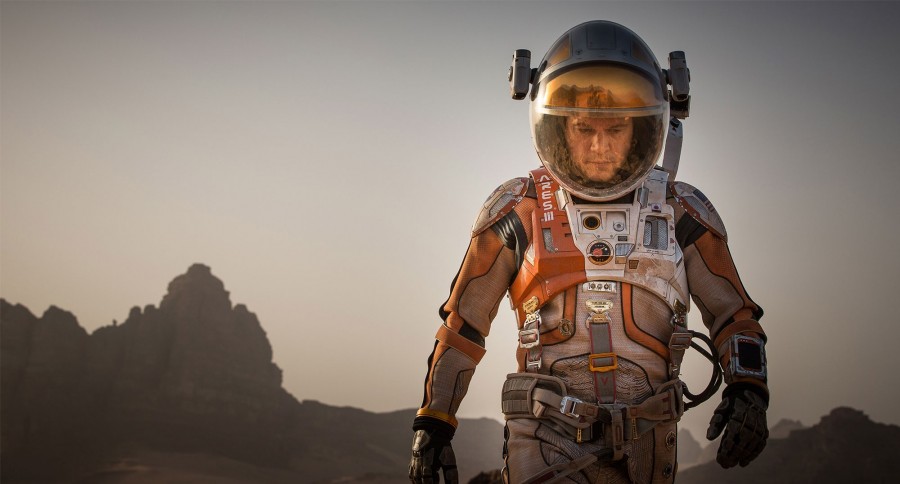“The Martian” Movie Review
October is finally upon us. At last the doldrums of rejected summer movies and the subpar fares of August can be forgotten. Finally we creep ever slightly into award season, a time of artful creation and deep, reflective cinema. But before inspired filmmakers dazzle audiences with their bids into the Academy Awards, we warm up with the most anticipated film of October, a film which presented great obstacles and even greater intellect by a charismatic and relatable astronaut. I refer to The Martian.
Based on a novel by former programmer Andy Weir, The Martian tells the unique tale of astronaut Mark Watney, played by Matt Damon, as he attempts to survive on Mars after being stranded by his crew and presumed dead. Ridley Scott directs, returning to top form after helming critical and commercials duds The Counselor and Exodus: Gods and Kings.
For an actor in complete isolation, Damon plays his part with subtly, sublimely garnering sympathy for Watney even when the plot pushes aside such development. Jessica Chastain, Chiwetel Ejiofor, Sean Bean, and Jeff Daniels star as concerned scientists trying to assist Watney from Earth. Meanwhile, Kate Mara and Michael Pena make notable appearances as some of Watney’s crew.
The Martian is an unusual beast. Nearly two and half hours long, the film moves through nearly two years of Earth-time, translating into around four months of martian time. Throughout his stay on the red planet, Watney is presented with scientific challenges: growing food in an atmosphere that does not allow bacteria to live, finding a way to reach NASA through radio communication, and performing surgery on himself, to name only a few. These challenges, with cutaways to Earth and NASA, construct the entirety of The Martian‘s narrative structure; this structure presents a fundamental problem of filmmaking and storytelling in general–there is no room for growth.
From the first frame of the film to the last, Mark Watney stays exactly as he is–a charismatic, relatable face in a sea of red rock. He is not the only character lacking in arc, however. Not one character in the impressive ensemble is allowed emotional complexity because The Martian is solely about Mark’s survival and NASA’s attempts at rescue. Nothing more. There is no despair in Mark’s eyes or movements as he cultivates food or repairs fractured equipment. There are no personal motives by the crew of NASA to save Watney; they simply attempt his rescue as a measure of PR rejuvenation. The only genuinely emotional response to his desertion comes from his own crew, but even they only quip and joke amongst each other. The lack of emotional depth causes the film to teeter on the brink of boredom and disinterest and if manned by a less competent, less headstrong director, the film could have devolved into long, tedious scenes careening towards a predictable outcome. Fortunately, Ridley Scott prevents just this scenario through two crucial elements–pacing and realism.
While it’s true that no character grows emotionally, The Martian accomplishes the impressive feat of centering itself around the entirety of its cast. No character is overlooked, no actor seems to be without use or motivation or purpose. In fact, no plot thread goes unused, no conflict seems superfluous, no minute is wasted by excessive scene-length. Scott jumps from one moment with Mark to another with NASA at just the right moments, as if there is no camera, as if the scene is ending naturally, without influence. The Martian‘s entire story, though one-dimensional, seems to be telling itself, free from the slightest clichés of a screenwriter’s mind, progressing almost organically as if the events are historic rather than fictitious. This organic flow is refreshing in the modern age, ditching the deeply emotional moments in order to create deeply immersing ones.
If you walk into The Martian, and I suggest you do, walk in knowing there are no narrative risks taken. Walk in knowing that the film is simply a journey, as in the days of Homer’s “Iliad” and “Odyssey,” taken with Matt Damon as he fights intellectually to overcome the deadly air of Mars and the uncertainty of his future. Know there is no growth, but there are still characters to root for. If you walk in knowing these things, you may learn, as I learned, that the capacity to solve painstaking problems in the toughest environment in the Solar System is just as entertaining to watch as a conflict involving two people, two guns, two armies. You may learn that the fate of one man’s life is just as enthralling as the fate of the world, if presented in the proper scope, by a master filmmaker.
7/10.
An afterthought: The Martian is very similar to Gravity and Interstellar. Each travels alongside a character in space who longs for the familiarity of home. In this humble critic’s opinion, the film takes less risks than the former but manages to dodge pointless melodrama unlike the latter. For these reasons, The Martian‘s quality is firmly cemented between the two. Gravity was special because it achieved a deep emotional connection through Bullock’s character and presented a thrilling roll coaster ride through a convincing zero-g environment.
The Martian skimps on both these qualities. Interstellar, however, is inferior to both because it became bogged down in the small-scale stories of McConaughey, his daughter, and the people of Earth rather than focusing on the Universe at large. The Martian and Gravity both excel in telling their unique stories while Interstellar failed to combine spectacular visuals with an unfocused plot. For this reason, The Martian and Gravity fulfilled and exceeded their potential, while Interstellar left me feeling empty.
This being said, I look forward to the next story of a lonely protagonist in space and how the filmmakers choose to balance his fate with the fate of those who wish to see him return.
Your donation will support the student journalists of Cypress Ranch High School. Your contribution will allow us to purchase equipment and cover our annual website hosting costs.







































